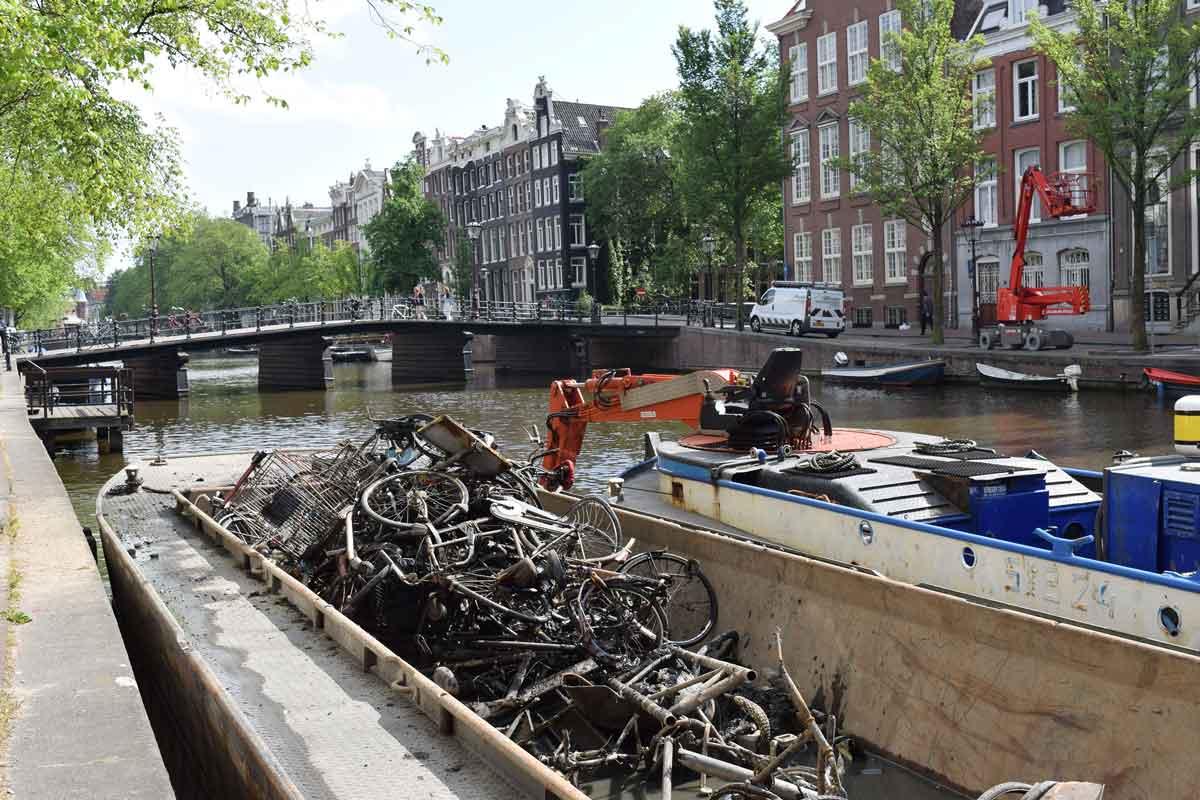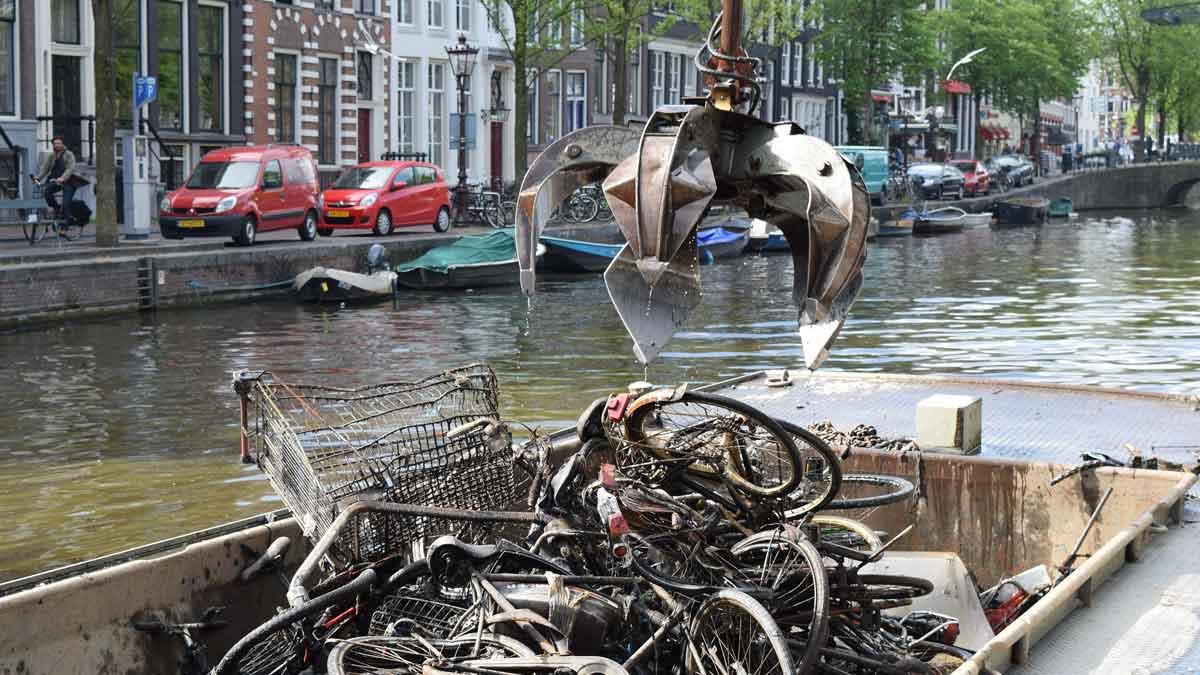Where people are paid full-time, with benefits, to fish for bikes
Bike fishermen use a giant claw to remove bikes and other detritus from the Amsterdam canals. The bikes are deposited on a trash barge, and later recycled for scrap.
I went to the docks in the very center of Amsterdam with, basically, one thought in my mind: This is going to be freaking awesome.
I mean, c'mon. It's bikes and fishing. For an Oregon boy, it doesn't get any better than that.
But then, it did.
I saw the claw.
It's like they plucked it straight from "Toy Story 3" and moved it to Amsterdam. It's a huge hydraulic claw, connected to a crane that sits on the front of the barge.
"That's our equipment for fishing the bikes out of the canal," says Diane Kleinhout, a spokesperson for Waternet, the agency tasked with keeping the canals clean.
Kleinhout says the company has been bike fishing since the 1960s. She says so many bikes were piling up in the canals; they were scraping the bottom of boats.
Along with her are the bike fishermen, Richard Matser and Jan de Jonge. They fish for bikes every day.
Why you ask?
"There are a lot of bikes in the water," says de Jonge.
That's why they tow an empty barge behind them. They need a place to put all those bikes.
We start trawling a block or so from City Hall. Matser pilots the boat while Jonge operates the claw, dropping it into the murky water.
"How do you know where the bikes are?" says de Jonge. "We don't know. We're just searching."
Fishing for bikes is like plunging your hand in a sink full of sudsy water, searching around for a spoon. You grab around blindly until you find something.
Pretty soon. We have our first bike.
These guys were good. We caught one on our third cast. This being Amsterdam, it was a black granny bike. It looked like the wheel was pretty shot. Someone probably tried to pedal it and was like, "Ehh, I'm good." So they hucked it into the drink rather than dealing with it.
This bike will eventually end up at a recycler. Just like all the other bikes the claw plucks out of the canals.
De Jonge says they catch 15,000 bikes a year. Yes. You read that right. To put it in perspective, the city of Amsterdam estimates there are 2 million bikes in the city. So while 15,000 is a huge number, it also means that only .07 percent of all the bikes end up in the canals each year.
Still, it's nuts.
The habit of throwing things into the canals goes way back.

"The canals used to be an open sewer," says Kleinhout. "There was no sewer system in Amsterdam so this was the open toilet for the people of Amsterdam."
In 1860 Amsterdam started to see — or rather smell — the error in that practice. They started to clean the canals up. And they encouraged people to stop using canals as a big 'ol trash can. But Amsterdam still hasn't totally kicked the habit of tossing things into the drink.
That's why there are bicycle fishermen. They keep the canals clear for boat traffic by hauling up one bike after another.
"Look, another bike!" says de Jonge.
It was a folding bike. But he says that still counts.
Now, we'd only fished for about a block. But we got quite a haul: six bikes, a shopping cart, that folding bike, and then, well, we pull up a walker. Even though it's all garbage. It attracts a crowd. Tourists and locals stop to look at what comes up.
"I joined them last week and we found a real professional camera, and a sign for traffic and a scooter," says Kleinhout. "It was a nice catch of the day."
Bikes are the main catch. In the next 30 minutes, the claw snatched 30 bicycles from the bottom.
And while the whole thing is cool, and endlessly fascinating — and the claw is worth worshiping — there's also this weird realization you get after seeing all the bikes. It's that in Amsterdam, bikes are litter.
It's not like the states, where some people (me) lust over bikes built by Vanilla, Icarus or Chapman.
I mean, in Amsterdam bikes are tools for transportation for sure. But here, they treat 'em more like keg cups at a tailgate. Easy to use. And easy to huck where you're done.
I ask de Jonge and Kleinhout why people toss bikes into the canal. They didn't know. De Jonge thought it was probably just drunk people doing drunk-people things.
There are other theories. Some say that bikes get thrown into the water by thieves, who just want dispose of their crime. Others blame cars for bumping bikes off the edge–there are no guardrails in the city. And still others believe that bikes really are like keg cups. The host of my airbnb rental says he picked one up for about $40 online. So if it costs more to repair, why keep 'em?
Waternet hasn't launched any public service campaign to stop the practice. They're relying on journalists like me to spread the word. But I think they might want to start, as the rate of bikes being thrown into the canals remains steady.
But until people stop throwing bikes into the canals, I do know there are two guys in Amsterdam with one of the best city jobs you'll ever get.
"I love my job," says de Jonge. "You're standing outside with a lot of freedom around you. So it's a nice job."
Of course it is. He's fishing for bikes.
